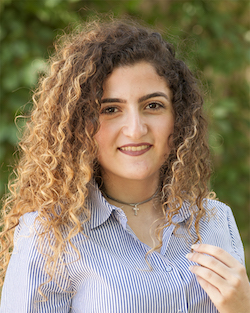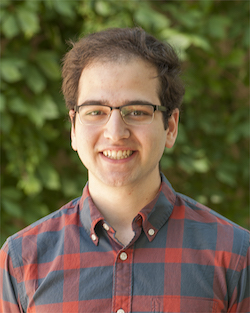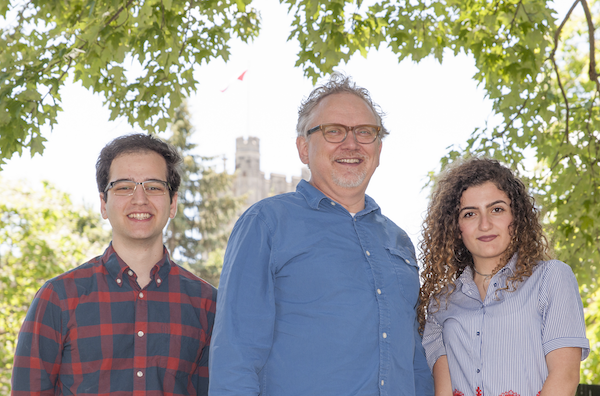Recognizing the Fabric of our Nation

Dr. Denis Maxwell
I received a phone call the other day. It was Denis Maxwell, a much-loved professor from the Department of Biology. Over the course of the conversation, he shared a thought he had as he scanned the cultural mosaic of faces in his classroom the previous day.
“They come to us from next door, across the province, country and world. They are all bright, but who are they, really?” he mused.

Massara Bethoon
Answering that call was the first step down an extraordinary path of discovery and reflection as it led to a meeting with first-year General Sciences student Majd Radhaa and first-year Basic Medical Science student Massara Bethoon, who each shared their history as refugees, thoughts about being Canadian and hopes for the future.
Like most, if not all of the thousands of refugees who have come to Canada over the last decade, Majd, Massara, and their families left a level of violence that threatened their very survival.
But, they also left behind family, friends and the familiar sights, sounds, scents and traditions that were a fundamental part of their identity.

Majd Radhaa
A thirteen-year old Majd, his siblings, father and very pregnant mother boarded the second-last commercial flight out of Syria. This was not the first time they had to flee. Born in Iraq in the same province as Massara, Majd’s family left the war-torn nation and moved to Syria to offer their children a safe environment, close, in relative terms, to home, with people with similar cultural norms and traditions. However, that did not last and they were on the move again.
Their first plea for refugee status to another nation was rejected. Of the nine potential reasons, the family’s paperwork indicated ‘other’. One of Majd’s siblings is alternately abled. He speculates that the projected cost of his healthcare was the reason for the family’s application being denied. Canada was one of the next countries on the list. The answer this time was positive, and the next chapter in Majd’s young life was about to begin.
By the time Massara and her parents landed at Pearson airport, she had already lived in three different countries in the Middle East. She was seventeen. Mom and dad spoke no English; Massara did, and that meant that she would be responsible for finding an apartment and reading, understanding and translating lease agreements. She would enroll in high school –in grade 12- and be faced with being the ‘new kid’, achieving grades that would allow her to move on to university, all while witnessing and trying to deal with her parents’ distress.
“None of us experienced a sense of safety and security before coming to Canada. Here, we have the right to work, the right to education, the right to healthcare. I believe that it is difficult to truly appreciate what you have unless you have come from a situation where you had none of it. The impact is extraordinary, almost overwhelming. I’m lucky. I arrived at a young age and so I’ve had time to adapt,” explained Majd. He continued, “My parents understood and were accepting of the fact that I would grow up as a Canadian and that would mean, from a practical perspective that I would learn to balance elements of Canadian culture with those ideals, behaviours and traditions into which I was born. You can do this in Canada. No one asks you to “give up” elements of your cultural identity. Realistically though, you do end up leaving certain traditions and perspectives behind. It’s part of learning how to fit in. I think that part of becoming Canadian is more difficult for the older generation.”
“I’ve only been in Canada for two years,” commented Massara. “We moved from Toronto to London because I was determined to go to one of the best schools in Ontario. In my culture, the notion of sending a young girl off to school, alone, is simply unthinkable. My parents once again left any support structure they had and followed me here. They don’t know anyone. They are having difficulty learning the language, and Canadian ways remain foreign to them. My parents’ life, as they knew it, is over.” As difficult as it was, and as thankful as they are to live in peace, they grieve for familiarity lost and they look to Massara to assume a monumental burden. She sums up the situation, “The success of my family now rests on me.”
Despite the challenges she and her family have faced – or perhaps because of them, Massara is driven to succeed. She intends to pursue a medical career after completing a BSc in Medical Science. Toughened out of necessity, she also maintains the light of hope in her eyes as she shares the wish to become a mother someday and tell her story of overcoming adversity to her progeny in order to ensure they appreciate the opportunities they have as Canadians while remaining true to their cultural heritage.
Majd recently became a Canadian citizen. From his perspective, being Canadian comes down to feeling safe and knowing that even when times are tough, the society in which we live will in some way help. “Canadians have the freedom to be who we are and to celebrate the elements of many cultures and traditions. We can rally behind causes and have fundamental disagreements with each other but we have the expectation of peaceful coexistence, so we work out our issues in such a way as to make sure we remain a cohesive society”. Coming from a part of the world with roots in antiquity, he notes that we are a very young country. We have made mistakes and must learn from them. We remain a ‘work –in– progresses’.
Majd will begin his second year of undergraduate study at Western in the fall of 2017. He hopes to harness his academic, extracurricular and life experiences to eventually work at a global level to facilitate the lives of other people in ‘transition’.
At the end of our discussion with Majd and Massara, Professor Maxwell shook his head in awe. This had been a great learning day for us all.
In this, the 150th year of our nation, as we celebrate being ‘Canadian’ there is an excellent opportunity to reflect on who we are – really – and take the time to listen to the stories that make up the fabric of our history and the thread of our future.
Happy Birthday Canada!


